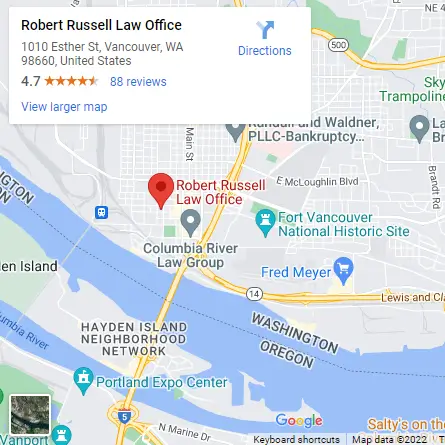Will and Estate Planning Attorney
Vancouver & Clark Country, WA
At the Robert Russell Law Office we provide estate planning services to cover all your needs. We not only help you protect your assets now; we also help you protect them later.
Last Will and Testament
With some exceptions, a Last Will & Testament determines who will receive your assets upon your death. Without a Will, state “intestate” laws determine who receives your assets. State intestate laws may achieve the same asset distribution as a Will, but it might not and the absence of a Will normally increases the cost of administering your probate estate because your desires are not clearly specified. See, RCW 11.12.010 et seq. It you desire a distribution different that intestate laws, you absolutely will want a Will. A Will removes any doubt as to your intentions and distributes your assets as you desire. At a minimum, a Will removes certain costs of administration and confusion as to your desires.
Health Care Directive / Physicians Directive / Living Will
A Health Care Directive directs what you want to occur if you are terminally ill or permanently unconscious and unable to speak for yourself. The Health Care Directive instructs doctors whether to use artificial means (including hydration and nutrition) to keep your body alive. In particular, it allows you to direct “withholding or withdrawal of life-sustaining treatment (if you are) in a terminal condition or permanent unconscious condition.” Having a Health Care Directive in place takes the question out of your desires and takes the burden of the decision off of your loved ones in a difficult time. See, RCW 70.122.030.
General Power of Attorney
A General Power of Attorney allows anyone (the “principal”) you designate to act on your behalf (the “attorney-in-fact” or “agent”) to make decisions, sign documents, and carry out other acts specified in the General Power of Attorney. It is described as “General” because it gives the appointed person (your “attorney-in-fact”) authority to take a wide variety of actions on your behalf. See, RCW 11.94.010 et seq.
Specific Power of Attorney
A Specific Power of Attorney (SPA) gives the person you identify the ability to take specific and enumerated actions on your behalf. It does not give the ability to act for you in all general matters. For example, you might give a person a SPA to sign a real estate transaction while you are out of town. The SPA would not allow them to, for example, open a bank account in your name. See, RCW 11.94.010 et seq.
Durable Power of Attorney
With some exceptions, a Power of Attorney becomes ineffective upon the disability/incapacity of the principal. A “Durable” Power of Attorney remains effective (or may become effective) upon the disability/incapacity of the principal. This can be a critical document for the continuation of your financial affairs if you become incapacitated. Without it, you may have to have a guardian appointed – and that can be quite expensive. See, RCW 11.94.010 et seq.
Living Trust
A Living Trust is a trust created by a person or spouses to “hold” assets for them for their life until death (or sooner, if revoked). Upon the death of the person(s) creating the trust, the trust says who receives ownership of the trust assets. So, in this way, it is much like a “Last Will & Testament” in that it says who receives assets upon death, but the assets in the trust pass directly to the beneficiaries without going through the court probate process. Living Trusts are often “revocable” which means that person(s) creating and transferring assets into the trust can change their mind and transfer the assets back from the trust to the creator of the trust. There is much more to such a trust. But this very brief description gives you something of an idea of their purpose. See, RCW 11.103.020 et seq.
Letter of Instruction
A Letter of Instruction is not a formal legal document. The Letter is simply a summary/list of helpful information about your personal and financial affairs. It can be quite useful to your family and friends if you become incapacitated or die. Information you include in a Letter might be: computer/account passwords, location of legal documents, list of family members and friends with their contact information, funeral and burial/cremation desires, list of assets and debts; list of insurance policies, location of investment account statements, deeds to property, tax returns, and anything else that is important and not otherwise written down and easily accessible.
Schedule an Initial Consultation
We can provide everything you need for most matters. If you have an estate planning question or need, please contact us and we’ll schedule your initial consultation.


